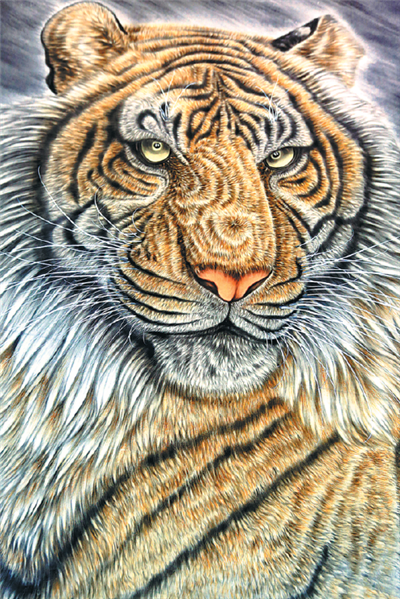When he learned to paint as a teenager, Xiao Yanqing, 52, a farmer in Henan province, could never have imagined it would lift him out of poverty.
 |
|
Portraiture is a popular format for tiger paintings by farmers in Wanggongzhuang village. China Daily |
Residents in Xiao’s native Wanggongzhuang village used to draw and sell new year paintings. The business dates back to the early 20th century, when a retired Imperial Palace craftsman brought the skill to the village.
In the 1980s, Xiao practiced in his spare time after farm work and traveled to cities to sell his pieces, which sold so cheaply he could barely make ends meet.
But 1998, the Year of the Tiger, proved a turning point in his life when a client ordered a tiger painting. “I used to paint flowers and birds, but not once had I painted a tiger,” Xiao said.
With no real tigers around, he borrowed a tiger painting from a neighbor to copy. His painting sold at a good price, and he realized he was onto something that could benefit his whole village.
“Chinese people love tigers. They hang tiger paintings in their homes because they believe the power of these animals can scare away evil spirits,” he said.
So he began to travel, not to sell paintings, but to zoos in northeastern China to observe tigers and dedicated himself to painting them.
It was a great success. In 1999, he was the first in the village to buy a color TV, and a year later a computer.
Using the internet, Xiao managed to sell his paintings abroad, first to Singapore, then to Japan, Europe and the United States.
He surprised the clerks of the local bank when he brought in US dollars to change for renminbi. “I guess they thought I was a criminal,” he said smiling.
Xiao’s success prompted friends to follow him, and more villagers joined later. Tiger painting is now a trademark of Wanggongzhuang. Over 60 percent of its 1,366 villagers are now in the business.
The village sells thousands of tiger paintings every year, with 40 percent going to overseas markets including Japan and Bangladesh. The total yearly revenue is 100 million yuan ($15 million).
Wang Jiansheng, in his 30s, has done a lot of jobs, from construction worker to butcher. None of them allowed him to buy a house. But he earns 300,000 yuan a year by painting-enough to run his own workshop. He plans to buy a big apartment in the Henan capital, Zhengzhou, and open a gallery there.
Follow this news feed: East Asia





